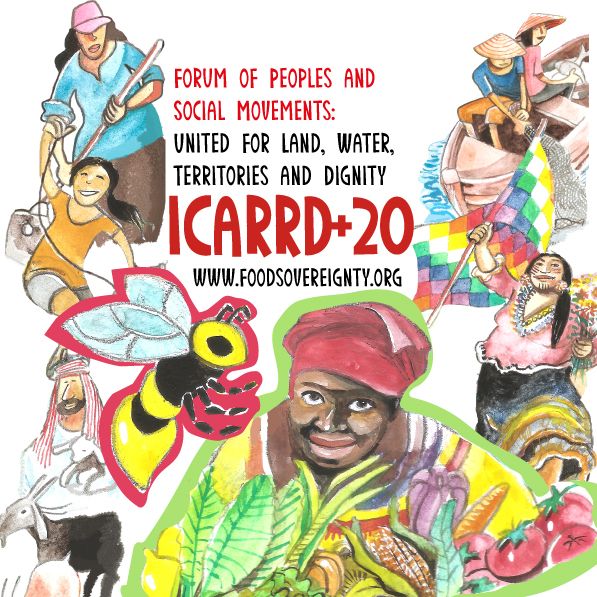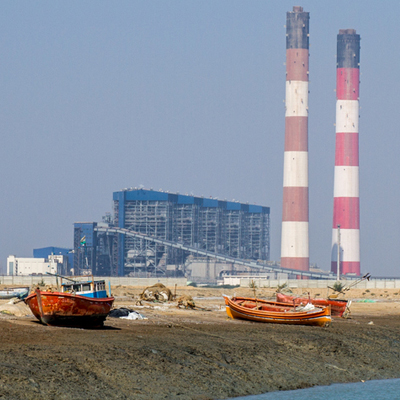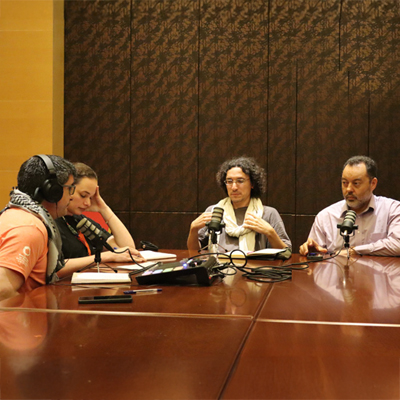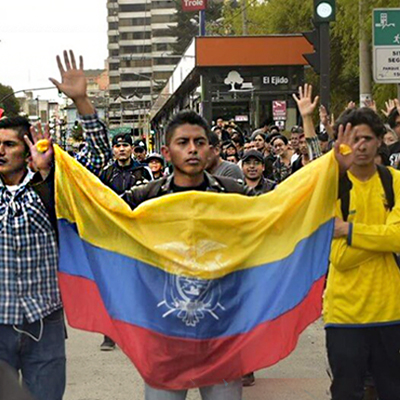Hard blow for communities suffering human rights violations at global level
International Law expert warns about negative aspects of new draft of the UN Treaty on transnational corporations and human rights
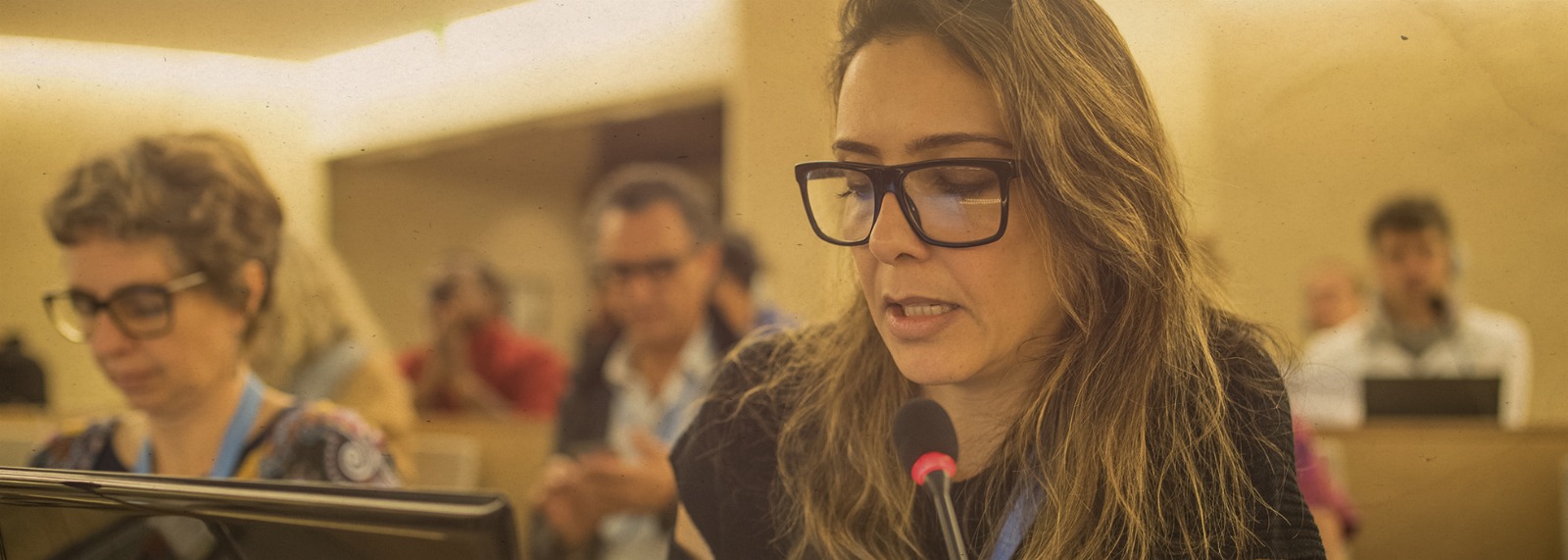 Real World Radio
Real World Radio
“The attempts to establish the supremacy of human rights over corporate logic are not covered in the entire text of the Draft 1”, warned Brazilian expert Manoela Roland about the new document presented by the Ecuadorian Chair in UN negotiations for a legally binding treaty on transnational corporations and human rights.
“In addition, the scope of the future treaty has been broadened, now establishing the possibility to hold all businesses accountable, not just transnational corporations”, she said. This is the most serious technical threat to the whole process, because it violates the mandate of resolution 26/9 of the Council, which gave way to the negotiations on the Treaty. This decision responds to the interests of the European Union and actors such as the International Organization of Employers. It is a very bad sign”, said Roland in an interview with Real World Radio. Thus, it does not address the legal void in international human rights law about abuses perpetrated by transnational corporations.
Environmental federation Friends of the Earth International (FoEI) made reference to this issue along a similar line, as well as the Global Campaign to Dismantle Corporate Power and Stop Impunity with a statement issued on Tuesday. This campaign gathers tens of social movements and organizations from all continents that push in favor of the Treaty.
Roland is a lawyer and International Law and Human Rights Professor at the Juiz de Fora Federal University in Rio, Brazil. She is also a Human Rights and Business Researcher and coordinates the Human Rights and Business Center (HOMA)., which is part of the Global Campaign.
The process of negotiations for a Binding Treaty on transnational corporations and human rights, which aims to develop this instrument to force companies respect these rights and bring them to justice when they don´t, began in a way in 2014, with the approval of Resolution 26/9 at the UN Human Rights Council. After this, there were four negotiation sessions of the Intergovernmental Working Group created with this goal. This group is chaired by Ecuador, one of the proponents of the new instrument.
The first document that served as a basis for the negotiations, known as the “Elements Paper”, was published in 2017. With the advance of international negotiations, in 2018 Ecuador presented the “Draft Zero” and now, on July 16, the “Draft 1” or “Revised Draft” was shared.
A weak document
In the interview with Real World Radio, Roland made reference to the difficult political context of the negotiations, which have always faced the EU´s attempts to block them. Along these lines, the expert interpreted that Ecuador aimed to respond to the EU´s demand to shift the focus of the Treaty away from transnational corporations in order to potentially ensure its continuity in the negotiation process. “It can be understood that it was the only way out for Ecuador”, she said.
However, she warned that the decision that the Treaty should cover all businesses actually “threatens the continuity of the process, because there are several analyses that recognize that if we include all businesses, then it will be difficult to move forward”. “It will be much more difficult, and it can give way to many other national lobbies which could even turn the Treaty into something unattainable”, she explained.
Roland complained about the “progressive weakening” in the ambition of the Treaty if you take into account the three drafts from 2017, 2018 and 2019. “In the Elements Paper there was a clear perspective about the primacy of human rights, especially over trade and investment agreements. In the Draft Zero there was a controversial article, number 13, which spoke of the primacy in terms of possibility, implying that trade and investment treaties should threaten human rights as little as possible. This already meant some weakening, but at least there was a direct reference to the primacy of human rights. Now, in Draft 1, it is gone”.
The failure to establish the primacy of human rights and the change in the scope of the Treaty to now focus on all businesses, not just transnational corporations, are without a question the issues of most concern for Roland. However, the expert made reference to several aspects that make the Draft 1 even weaker, according to her.
“Another issue is that there are no direct provisions or obligations for transnational corporations”, one of the aspects proposed by social movements in the framework of the Global Campaign.
Roland highlighted that social movements, academic groups, movements that represent the victims of human rights violations and the civil society in general, have provided many contributions to the negotiation process. “But this joint process is not contemplated in the Draft 1”, she said. “This raises many doubts about the transparent and democratic continuity of the process”, she added.
The lawyer also said that “there are some missing elements which were raised by the civil society”, among them the importance of an international court of justice to try transnational corporations and mechanisms to monitor the enforcement of the Treaty.
Roland believes that it is necessary to have the civil society be part of this monitoring work, because “companies cannot monitor themselves, and the States don´t have this capacity”. The participation of the civil society in monitoring the enforcement of the Treaty was present in the Elements Paper, said Roland, a bit weaker in the Draft Zero, but now it has been almost entirely removed from the Draft 1. This disregard for social actors “is quite symbolic” said Roland, because we are living in times where social movements are strongly criminalized. “We need to say that historically, the civil society has played a key role in terms of human rights, for the advance of these regulations. And that participation has been crucial in this process”. “However, the Draft 1 disregards the importance of social movements in processes that take place in their own territories”, regretted Roland.
Another negative aspect of the document submitted now by Ecuador, according to the expert, is that it focuses on the States. “This logic, which is not a human rights logic, was historically established because the States really have the power to violate these rights. But today, transnational corporations act even more strongly, violating human rights as well, many times with more power than States”, she said. “We are reproducing a classic logic that does not respond to the need to hold corporations effectively accountable, which is the mandate of resolution 26/9”, complained Roland. She added that “States are also weak, they attract transnational corporations with a favorable environment for foreign investments and with weaker standards in terms of human rights”. Roland also explained that these States are many times captured by transnational corporations and comply with the conditions imposed by them, thus establishing a favorable environment for human rights violations.
She then said that in the negotiations about the Treaty there are no clear mechanisms to avoid corporate capture, no ways to ensure that victims are empowered in the process to access justice and that the criminal responsibility of companies is extremely weak in the Draft presented by Ecuador. “They only make reference to “gross violations”, but do not contemplate more common violations, related to economic, social and cultural rights, perpetrated by corporations”.
The struggle for justice continues
Real World Radio asked the HOMA Coordinator if there are any positive aspects in the new draft. She said that it is something positive that there is a draft in the global context of the advance of conservatism and persecution against social movements and that they give three months for the civil society, in addition to States and other actors, to make observations to the new document. This needs to be done before the new round of official negotiations that will take place from October 14 to 18 in Geneva. Roland also recognized that there is an attempt by Ecuador to ensure the rights of victims and access to justice.
The International Law, Human Rights and Business Expert said that the Global Campaign to Dismantle Corporate Power hopes that governments will participate constructively in the new round of negotiations. She highlighted that the EU, now that its idea to include all companies, not just transnational corporations, has been accepted, should be actively involved. Meanwhile, social organizations will pressure governments to address and amend all negative aspects of the Draft 1.



